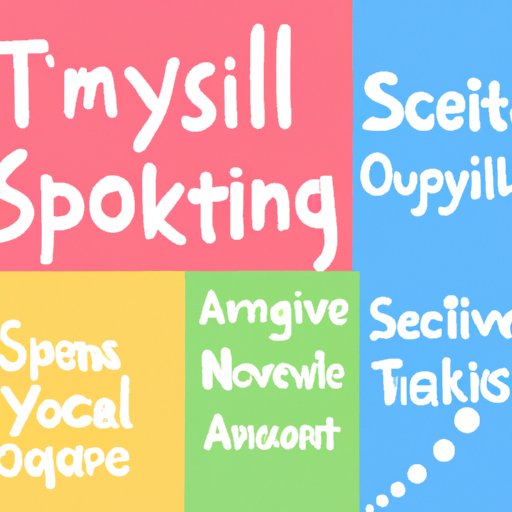Introduction
Self-confidence is the belief in one’s own abilities, qualities, and judgment. It is an essential part of mental health and well-being, providing a sense of security and self-worth. Low self-confidence can lead to feelings of depression, anxiety, and insecurity. In contrast, having a healthy level of self-confidence can help you succeed in all areas of life.
In this article, we explore how to build confidence in yourself. We discuss practical tips for recognizing and challenging negative self-talk, setting realistic goals and celebrating successes, practicing positive affirmations, engaging in activities that build self-esteem, learning to accept compliments, and developing a strong support system.
Identify and Challenge Negative Self-Talk
Negative self-talk is one of the biggest obstacles to building confidence. It involves negative thoughts and feelings about oneself, such as “I can’t do anything right,” or “I’m not good enough.” These thoughts can be damaging to our self-esteem and make us feel powerless to change our situation.
The first step in building confidence is to recognize the signs of negative self-talk. When you catch yourself thinking negatively, take a moment to pause and consider whether these thoughts are true. It’s important to challenge these thoughts and replace them with more positive ones. For example, if you find yourself thinking “I’m not smart enough,” try to reframe the thought in a more positive way, such as “I am capable and I can learn new things.”
Set Realistic Goals and Celebrate Successes
Setting realistic goals and celebrating successes is another important step in building self-confidence. Goals can help you stay motivated and provide a sense of accomplishment when achieved. However, it’s important to set achievable goals so that you don’t become overwhelmed or discouraged. Break down large goals into smaller steps and celebrate each success along the way, no matter how small.
According to research, “Celebrating small victories helps to reinforce progress and motivate people to continue striving for their goals.”1 So, take the time to recognize and reward yourself for even the smallest accomplishments. This will help to boost your self-esteem and give you the confidence to keep going.
Practice Positive Affirmations
Positive affirmations are positive statements that focus on specific goals or aspects of ourselves. They can help to reprogram our thinking and create a more positive outlook. Writing down positive affirmations and repeating them throughout the day can help to reduce stress and boost self-confidence.
For example, if you want to increase your self-confidence, some affirmations might include “I am capable and confident,” or “I believe in myself and my abilities.” The key is to be consistent and repeat these affirmations regularly.
Engage in Activities That Build Self-Esteem
Engaging in activities that build self-esteem can also help to boost confidence. Exercise is a great way to release endorphins and improve mood. Developing a hobby or skill can also be beneficial, as it provides a sense of accomplishment and pride. Volunteering for a cause you care about is another way to build self-esteem and make a difference in the world.
Learn to Accept Compliments
Learning to accept compliments is another important step in building self-confidence. Many people struggle to accept compliments, but it’s important to acknowledge them and respond graciously. When someone pays you a compliment, take a moment to really process it and appreciate the kind words.

Develop a Strong Support System
Having a strong support system is essential for building self-confidence. Reach out to friends and family members who are supportive and understanding. You can also join a support group or online community to connect with others who have similar experiences.

Focus on Your Strengths Rather Than Weaknesses
Finally, it’s important to focus on your strengths rather than weaknesses. Make a list of all your positive qualities and keep it handy for moments of self-doubt. Think about what you’re good at and use that knowledge to build your confidence.
Conclusion
Building confidence in yourself is a journey. It takes time, patience, and practice. By following these tips, you can begin to recognize and challenge negative self-talk, set realistic goals and celebrate successes, practice positive affirmations, engage in activities that build self-esteem, learn to accept compliments, and develop a strong support system. With consistency and dedication, you can gain the confidence you need to reach your goals and live your best life.
(Note: Is this article not meeting your expectations? Do you have knowledge or insights to share? Unlock new opportunities and expand your reach by joining our authors team. Click Registration to join us and share your expertise with our readers.)
